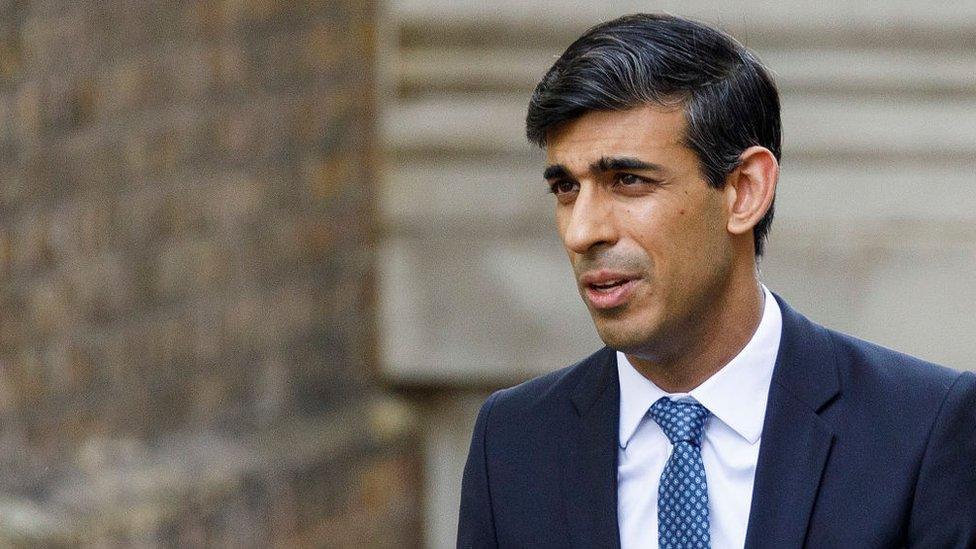Will Sunak's moment show a radical response?
- Published

After "the grid" - the carefully planned build-up of government announcements that will reach its crescendo today - we have a good idea of Rishi Sunak's shopping list.
Extra cash for employers to take on trainees and apprentices, likely changes to stamp duty and perhaps cuts to VAT for some sectors.
And there is room too for some Treasury old favourites, like subsidies for green insulation.
Government insiders hope there will be something left as a surprise for the chancellor to deliver at the end of his moment in the House of Commons at lunchtime on Wednesday.
But until that concludes, the question hangs, not just over the narrative of a single day, but how radical this government is willing to be.
At the start of the pandemic, when the government enforced shutdown on the economy, the Treasury decided the only way to avoid disaster was to move far and fast - to forget ideology and to start paying the wages of millions of people who couldn't work through no fault of their own.
And as the weeks went on that approach extended both in time and scope.
It was as un-Tory as you get, but Sunak's calculation was the times demanded he forget convention.
Giant spending and giant borrowing kept many people from the brink.
The government is looking now to the second phase of the crisis, when the worst stage of the health aspect has passed and they hope the economic recovery can begin.
But job losses have begun, with barely a day going by without an announcement from a household name they are shedding staff.
'Jobs, jobs, jobs'
The reality is many of those who have been paid by the Treasury will find their job doesn't return.
The focus of the chancellor's statement, therefore, will be "jobs, jobs, jobs", insiders say.
One former cabinet minister says, simply, that Mr Sunak has to "throw the kitchen sink" at preventing mass unemployment.
Another senior government figure suggested that the times demand massive action, saying: "What's the alternative? We can't just watch millions of people go to the wall."
Will the measures meet the moment?
There will certainly be a long list of proposals from the Treasury.
It's not a small matter to do something like cut stamp duty, cut VAT in some sectors, accelerate infrastructure spending, or provide £2bn to subsidise jobs for young people.
You can read more about the plans we already know about here.
But they are certainly much more orthodox actions than the kind of drastic steps the Treasury took at the start of this crisis.
Indeed at first glance, what will be called the "kickstart jobs scheme" to help young people without work is not a million miles away from the "future jobs fund" introduced by Labour in the last economic crisis more than 10 years ago.
This time the government says they will spend £2bn and help provide work for 300,000 people.
Last time, the plan was ultimately to provide about 200,000 jobs at a cost of £1.3 billion.
It did get lots of young people into work, but it didn't meet those expectations, and was described by David Cameron as one of the "most ineffective job schemes there has ever been" - before he cancelled it after becoming prime minister to an outcry from Labour.
We'll get full details of how this crisis job scheme works on Wednesday and it won't be identical to that effort.
But right now, overall, it seems like the action the government is poised to take to prevent mass job losses is much more familiar than what they did at breakneck speed at the outset of the coronavirus crisis.

It may be right not to try to reinvent the wheel.
A former Treasury minister suggested it is still right for the chancellor to keep more drastic action in reserve.
This situation is so strange, so unprecedented, that they believe it is wise for the government to wait, to monitor all our economic behaviour day-by-day before unleashing any more bazookas that could have enormous costs.
But even on the Tory benches, others are more impatient.
One member of the government cautions: "There appear to be some in and around HM Treasury who seem to think that we can make minor tweaks, throw in some extra job training and everything will go back to normal.
"They are misreading the moment, both politically and economically. We will see economic disruption and a rise of unemployment of a scale not seen since the 1980s.
"Huge, transformative action is needed."
And another former Cabinet minister says: "It doesn't feel like they are coming up with smart innovative ideas - if you take the same route as those before you end up at the same destination."
Prospects and prosperity
Until Sunak sits down after his marathon moment at the despatch box, we can't know the true scope of what he has up his sleeve.
So far, the still relatively new chancellor is considered to have under-promised before big moments, and then delivered more than was expected - less common in SW1 than you might expect.
And the merits of his plans won't be judged for many months.
Most importantly, the measure will not just be how he fares in the Commons, but with what happens to the lives and prospects of millions and the prosperity of the country.
But this is a government that likes to talk about change, boasting of a willingness to shake things up.
And the chancellor's statement will also be a measure of how radical, and how imaginative, Boris Johnson's tribe really is.
